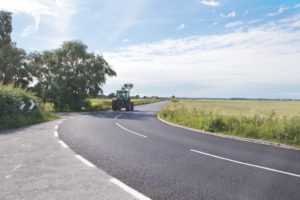The UK’s first carbon neutral road scheme included the use of a low energy production technique, recycling and carbon offsetting and has been carried out as part of a Highways England (HE) resurfacing project in Cumbria.
The road improvement project included full-depth recycling of the dual carriageway between the M6 junction 36 and Brettargh Holt roundabout, along with the roundabout at junction 36. It forms part of the A590 scheme designed with a low carbon strategy to ensure safer, smoother journeys for road users.
The heavily trafficked route had come to the end of its life with potholes and uneven surfacing posing a safety risk to road users. HE’s objective was to ensure the new road was constructed quickly, safely and with minimum disruption to customers and the local road network, while meeting its ambitious carbon reduction targets.
Early contractor involvement (ECI) 18 months prior to the contract starting, with principal contractor AE Yates and designer AMEY, saw Aggregate Industries recommend a Foamix approach.
This design option meant that the structural layers of the existing road were recycled and reused back into the new road by producing an ex situ cold recycled asphalt which, when combined with the company’s SuperLow asphalt, helped to achieve a carbon neutral scheme.
An onsite mixing plant ensured a continuous and consistent Foamix material. This was supported by a fleet of dumper trucks to transfer the mixed material to site and return the extracted planings, maximising efficiency and allowing 1,000 tonnes of Foamix asphalt to be laid per night. The team worked 24 hours a day across two shifts, ensuring minimum disruption to the local area and keeping ahead of all key deadlines.
Using this approach reduced CO2 emissions and negated the need for, and costs of, truck movements relating to initial waste disposal or recycling to a remote plant, improving the sustainability credentials of the project. The result was a 43% reduction in carbon emissions compared with using conventional resurfacing materials and methods.

In a first for the asphalt industry, Aggregate Industries purchased a number of credits to offset the remaining carbon on the scheme through its partnership with Circular Ecology (a non-profit organisation).
Construction took place safely under COVID-19 regulations with 50,000 tonnes of material extracted from the original pavement and recycled. Of this, 23,188 tonnes was used with the Foamix laid using wide pavers (extended to eight metres); 4,062 tonnes was reused within asphalt; 2,749 tonnes used on site; and the remaining 20,000 tonnes reused on the A590 Cross-a-Moor Roundabout Scheme and the strategic road network.
Guy Edwards, CEO at Aggregate Industries UK, said: “By working collaboratively through ECI, we were able to identify a low-carbon approach designed to provide significant environmental and, in turn, cost benefits.”
“As we continue to work more closely together as an industry and utilise our expanding range of eco-friendly products and services, we can start to make a real difference when helping to deliver essential infrastructure projects.”
CEMEX has also launched a new range of reduced carbon asphalts, which includes the option to offset residual CO2e to make it certified CarbonNeutral®.
VIALOW low temperature, low carbon asphalt, uses a bitumen additive to enable manufacture at up to 40°C lower than standard asphalt mixtures, without compromising performance, and with the added benefit of achieving up to 20% reduction in embodied carbon emissions.
Carl Platt, Director of Asphalt, Paving and Building Products for CEMEX Europe, said: “As technology and the industry shifts toward low carbon asphalt, the best interim way to sequester the rest of the CO2 footprint, to make it a carbon neutral product, is through carbon offsetting. This is what we are doing, working with Natural Capital Partners, with VIALOW Zero.”
In addition to its low carbon credentials, the new range offers customers other benefits associated with Warm Mix Asphalts including improved safety and efficiency, with increased shift outputs and earlier reopening to traffic, reducing disruption to road users.
“We recognise that future construction needs to be balanced with the effect it is having on the environment,” added Carl Platt.
“We are committed to improving the sustainability of our operations and supporting our customers to do the same. This new range makes it simple for customers to choose more sustainable and environmentally-friendly asphalts that have a lower embodied carbon, offset residual emissions and help drive change.”

 CONTACT US
CONTACT US SUBSCRIBE
SUBSCRIBE FOLLOW US
FOLLOW US LINKEDIN
LINKEDIN